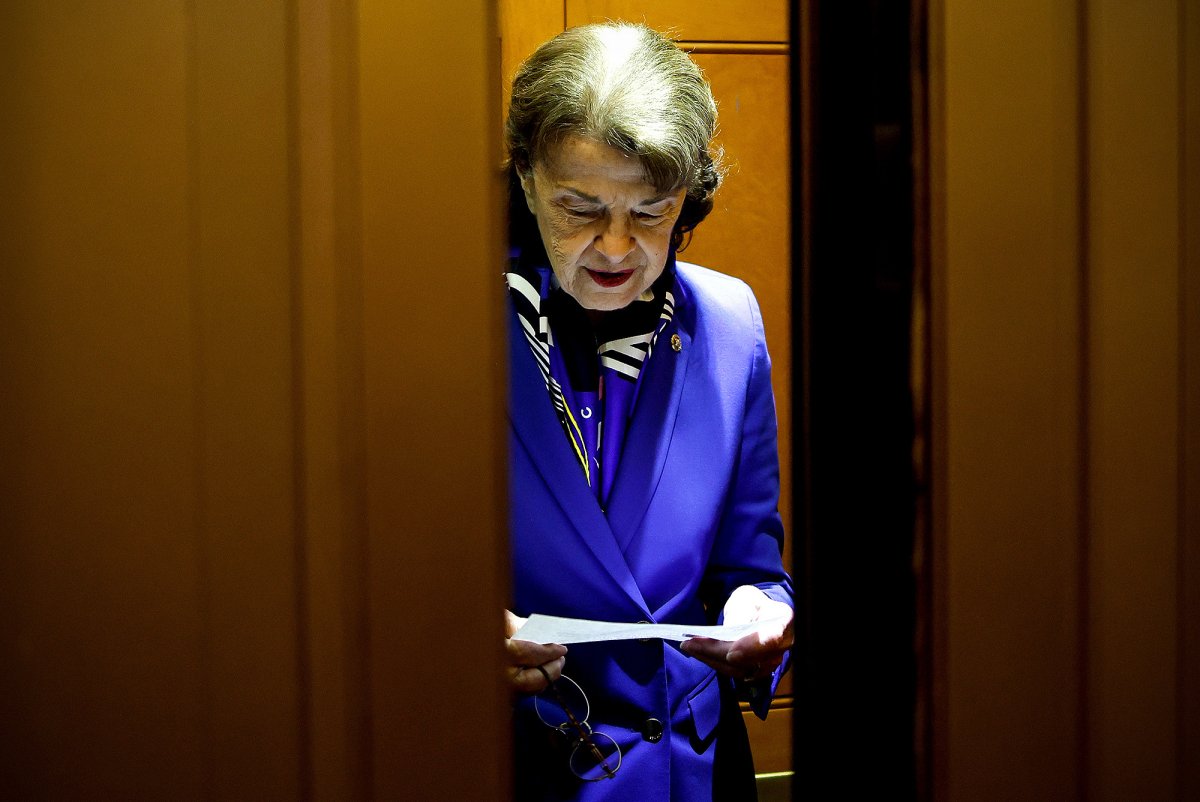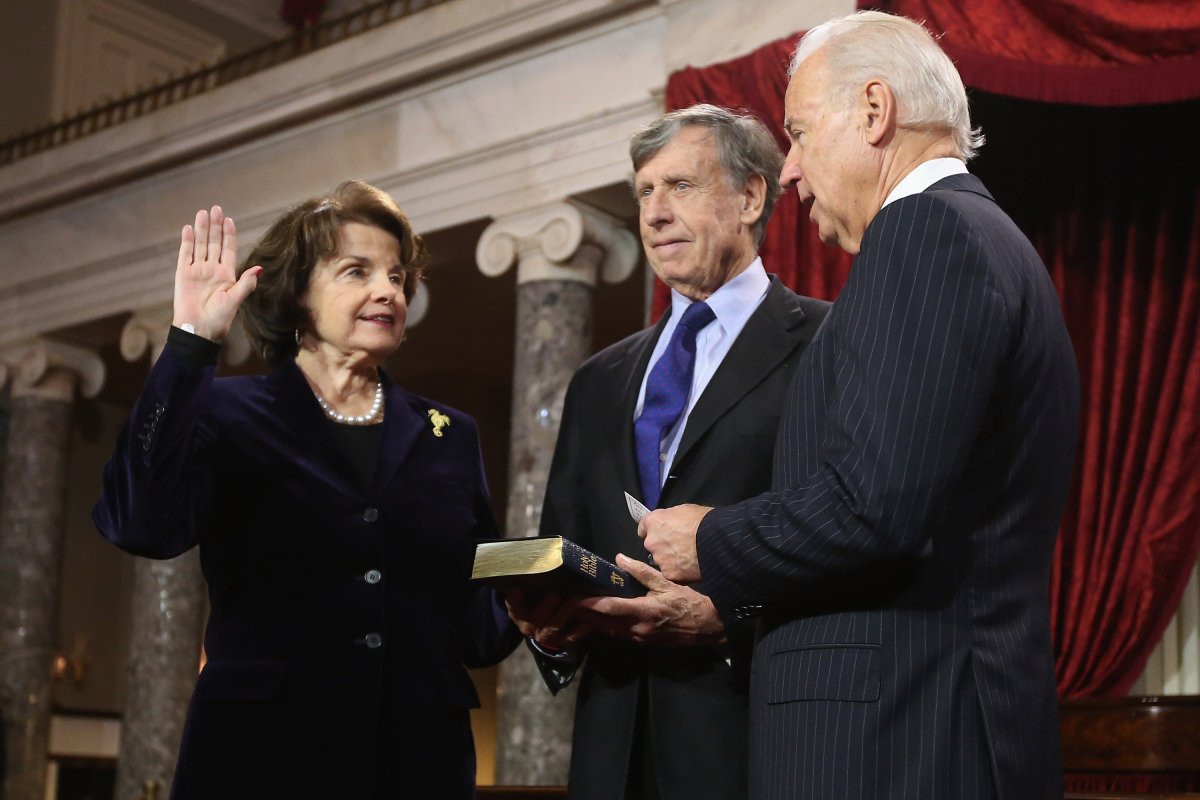The absence through illness of California Senator Dianne Feinstein has been causing headaches to the Democrats, with the party split on how to deal with the situation.
Feinstein, 89, has been out of action since early March as she recovers from the shingles at her San Francisco home following a spell at the hospital.
During this time, Feinstein has missed dozens of Senate votes. Crucially, Feinstein's absence has meant that the Senate Judiciary Committee, of which she is a member, has been unable to confirm some of President Joe Biden's judicial nominees, with numerous currently stuck in limbo as they wait for the Democrat's return.

Some Democratic colleagues have called for her to quit so she can be replaced, while others have expressed concern that it might look bad for the party if it appears she has been forced to retire. If Feinstein decided to resign, California Governor Gavin Newsom would appoint a replacement.
Christopher Devine, an associate professor of political science at the University of Dayton in Ohio, said that Feinstein's absence will "only become more trying" for Democrats as the upper chamber looks ahead to future key votes, such as whether or not to raise the debt ceiling.
'Can No Longer Fulfill Her Duties'
"This also creates problems for Democrats, in terms of strategy and morale," Devine told Newsweek. "Do they try to change filibuster rules, in order to force through a temporary replacement for Feinstein on the Judiciary Committee? Do they try to find other ways to strongarm Republicans into allowing a replacement, like doing away with 'blue slips'? Or do they focus on trying to convince Feinstein to retire?"
In the 118th Congress, Democrats hold an 11-10 advantage over the GOP on the Judiciary Committee. With Feinstein currently unavailable through illness, the committee chairman, Dick Durbin, confirmed they could not vote to confirm any judges in case of a 10-10 split, as a "tie vote is a losing vote."
Amid several calls from her own party to resign, Feinstein, who has vowed to return to D.C. "soon," requested on April 12 that Senate Majority Leader Chuck Schumer appoint a temporary replacement for her on the Judiciary Committee to allow the Senate to confirm justices.
However, the move needed unanimous support in the Senate, with South Carolina Senator Lindsey Graham, the Judiciary ranking member, formally objecting to the measure on April 18 to prevent the Democrats' plans to "force through their very worst nominees."
The move to temporarily replace Feinstein on the panel could go to a roll call. However, it is unlikely that a vote would ever pass as it would require the support of at least 10 Republican senators to reach the 60-vote threshold.
A number of House Democrats have already called on Feinstein to resign from office. Rep. Ro Khanna of California said on April 12 that it was "obvious she can no longer fulfill her duties" because of her continued absence.
Rep. Dean Phillips of Minnesota also tweeted that it was a "dereliction of duty" for Feinstein to remain in the Senate, and Congresswoman Alexandria Ocasio-Cortez of New York said that Feinstein resigning was "unfortunately something that I think it is appropriate to consider."
A Double Standard?
But Democrats may be wary of the optics that trying to force a veteran senator to retire could put forth, especially one who is currently the oldest member of the U.S. congress.
There have been suggestions from members of both parties that the demands for Feinstein to resign are sexist and ageist, with many noting similar calls were not made from Democrats for Pennsylvania Senator John Fetterman, with the 53-year-old having also spent weeks missing Senate votes while receiving treatment for depression.
"It's interesting to me," former House Speaker Nancy Pelosi said on April 12. "I don't know what political agendas are at work that are going after Senator Feinstein in that way. I've never seen them go after a man who was sick in the Senate in that way."
Thomas Gift, an associate professor who heads the Center on U.S. Politics at University College London, said that the situations between Feinstein and Fetterman were "conceptually different" for Democrats.
"Feinstein's term is ending next year, and she's already announced her intention not to run again, whereas Fetterman's term is just beginning, and—given his age—he could conceivably stay in the Senate for many more years," Gift previously told Newsweek. "Although her fellow Democrats wouldn't say it this way, that makes Feinstein politically dispensable in a way that Fetterman isn't."
There has also been more pressure on Feinstein to return as Fetterman is not on the key Judiciary Committee, and therefore not needed to confirm Biden's judges.
Feinstein has previously confirmed she will not seek reelection in 2024 but intends to see out the rest of her term, meaning she is to remain in office until January 2025.
Devine suggested that by attempting to essentially force Feinstein to resign early could "bring up a lot of uncomfortable conversations" in a body where most of its members are senior citizens.
"If Feinstein can be pushed out in this instance, some senators may wonder what will happen in the future, when they are the ones whose health is at issue and whose vote is needed in the Senate," Devine told Newsweek.

The median age in the Senate currently stands at 65.3, according to the Pew Research Center, with Republicans and Democrats essentially on par. Four senators are over 80 years old—Feinstein, Bernie Sanders from Vermont, 81, Minority Leader Mitch McConnell from Kentucky, 81, and Chuck Grassley, 89, from Iowa.
Hank Sheinkopf, a longtime Democratic strategist based in New York, suggested that the current standoff between Feinstein and the Democratic Party is like "putting your hand on a boiling pot on the stove."
"This is a woman who has served well, who is centrist and who is a senior citizen," Sheinkopf told Newsweek.
"If you attack her for being old, it looks like you're also attacking her for being a woman who has accomplished something. It's a very, very sensitive situation.
"So the question is, do you push her out and suffer the consequences? Or do you keep her there," Sheinkopf added. "It's likely that there'll be a move to try to just keep things calm until next year's elections, when she's not running for reelection anyway."
'Her Own Harshest Critic'
However, doing nothing could play more into Republicans' hands and give them an advantage in the upper chamber where they are currently the minority party.
As well as hindering the work of the Judiciary Committee, the GOP may choose to stand by and allow the Democrats to slowly turn on the highly respected 89-year-old.
"Why would you want to give the Republicans—who can't win Feinstein's California seat anyway—the opportunity to make this a national issue where they can attack Democrats for being sexist and ageist?" Sheinkopf added.
Chuck Grassley, Republican senator and longtime member of the Judiciary Committee, accused Democrats of trying to force Feinstein out of office "because she's old."
"I don't intend to give credence to that sort of anti-human treatment," Grassley said.
Crucially, no Democratic senator has yet openly called for Feinstein to resign, although others are already suggesting the issues with her absence will get worse should it continue.
Sen. John Hickenlooper, a Democrat from Colorado, told Politico that he is "not going to pressure her one way or the other.
"But if it's going to be months and months? My guess is that...she will be her own harshest critic," Hickenlooper said.
Despite previously saying she was hindering the work of the Judiciary Committee, Sen. Durbin also said he will not suggest Feinstein resign.
"This is her decision. She's had a remarkable career in the Senate. I'm not going to make that decision or even suggest it," Durbin said.
Newsweek has contacted Feinstein's office by email.
On Wednesday, April 19, White House press secretary Karine Jean-Pierre was asked whether Feinstein had an "obligation" to resign if she cannot contribute to the judiciary nomination process.
"It is her decision to make," Jean-Pierre said. "When it relates to anything about her future, that is for her to make. The president has been very clear about that."
Uncommon Knowledge
Newsweek is committed to challenging conventional wisdom and finding connections in the search for common ground.
Newsweek is committed to challenging conventional wisdom and finding connections in the search for common ground.
About the writer
Ewan Palmer is a Newsweek News Reporter based in London, U.K. His focus is reporting on US politics, domestic policy ... Read more
To read how Newsweek uses AI as a newsroom tool, Click here.








